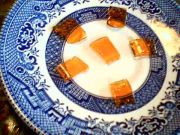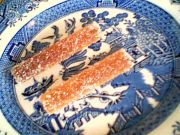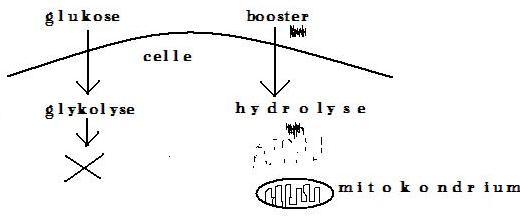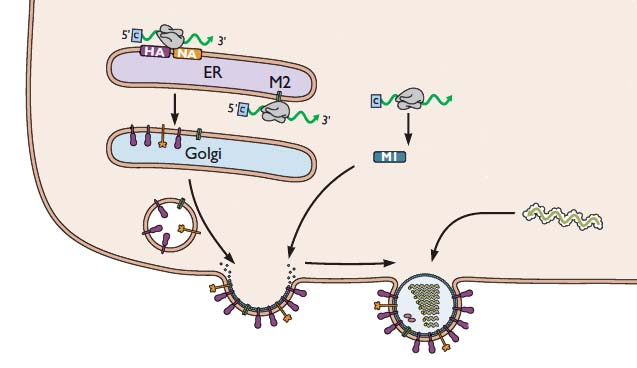Ottar Stensvold
(Regarding autoimmune MS and diabetes:
My idea is to take down the protein markers
which the T-cells home in on when they perform autoimmunity, and/or target the receptors /
surface proteins on the T-cells which they use in this task. In cancer, I want to target oncoproteins with oncogenes. At GenBank we can find some of the needed gene/protein sequences.)
I try to explain my theory in this video:
http://www.youtube.com/watch?v=7834CXASQF8
I found these articles supporting my theory about amino acids` binding to their cognate codons (triplets):
PART 1
Quick web searches on the topic ribosome all show the same:
the amino acid-loaded tRNA arrives at the ribosome with its
anti-codon first. I think this is an oversimplification, which
doesn`t take notice to the probable, intuitive fact that the gene is
a blueprint for the protein, a mirror-copy made through evolution.
Say the proteins initially instructed the genes and not vice versa.
Say the food came first, and then the means to carry it.
For such a complex process as translation to proceed without many errors,
there has to be a primary mechanism of proofreading. Maybe there is a
closer link between amino acids and the mRNA than previously thought.
that could match any protein, almost as an antibody. The oligonucleotides
and hence destroy the culprits. Say, put a virus in a PCR machine and make
cheap copies of tailored antibodies! Or use the new oligo synthesis factories!I try to explain my theory in this video:
http://www.youtube.com/watch?v=7834CXASQF8
I found these articles supporting my theory about amino acids` binding to their cognate codons:
http://www.ncbi.nlm.nih.gov/pubmed/14561881?dopt=Abstract’,’NCBI’,’700′,’400′)
Reinhold Zieglers veg 14 B
6414 Molde
Norway
mobile: +47 95 177 433
epost: ottarstensvold@hotmail.com
web: http://ottarstensvold.spaces.live.com
born: February 7th 1971
——————————————
the bacteria in the water lines up, symbolized like this: o…..o..o…o…o
These lines are best seen at 400x magnification. See example picture at bottom of this page.
My theory / idea is that DNA from ruptured bacteria binds and absorbs proteins
from its own species.
So what? If so, if a nucleic acid can bind to a protein in a coded manner,
then the aptamer technology is the tech of the future.
Say for instance the codon GUG, which codes for the amino acid valine, weakly
binds this amino acid. Symbolized like this: E-<
The codon-amino acid binding gives several combinatorial possibilities with
regard to polar interactions, mechanic fit and R-group placement.
If we can make aptamers tailored to bind specific proteins, then we can
take down any pathogen.
PART 3
can be found at GenBank:
The approach I will use is basically to design aptamers that are based on
the amino acids` corresponding codons. In the DNA-aptamers, I will replace
U with T, and in the third wobble-position I will choose the assumed least
interfering base (T). RNA aptamers can also be used.
There is a chance that the aptamers will match directly.
The matches have to be at accessible parts of the protein`s surface.
The aptamers will be ordered (outsourced), for instance from:
or from Eurogentec in San Diego, California:
http://www.eurogentec.com/news/106-eurogentec-launches-new-oligo-synthesis-facility.html
i.e. monoclonal antibodies.The stock of different aptamers will be annotated at my portable computer.Then, step 2, we have to beg institutions which store HIV viruses to test the aptamers in vitro.
The results can be viewed with electron microscopes.
(One can also test aptamers on oncoproteins in stored tissue samples,
e.g. the 17 aa CD44 protein which is overexpressed on membranes on glioma cancer brain cells.)
This project needs help from media. The headlines could be:
“Burn off money to test HIV drug”
“Find miracle drug”
Press: “Will this be tested in humans? Will there be marketing? Sales?
Investing?”
Answer: ”We will find a balanced solution, it`s fair that developed
countries pay for some of the venture.”
The task will require all communication skills and business intelligence.
It is a bit like cloud computing: once the hidden codes are found,
they have to be administered.
It is my goal to reach this goal of my life!
——————————————
(or ggttggtgtggttgg)
or GGU UGG UGU GGU UGG (in RNA) correspond to the amino acids:
gly trp cys gly trp abbreviations:
G W C G W
I found it at:
http://bloodjournal.hematologylibrary.org/cgi/content/abstract/83/3/677?maxtoshow=&HITS=10&hits=10&RESULTFORMAT=&fulltext=aptamer&searchid=1&FIRSTINDEX=0&sortspec=relevance&resourcetype=HWCIT
http://www.ncbi.nlm.nih.gov/nuccore/169808403?ordinalpos=1&itool=EntrezSystem2.PEntrez.Sequence.Sequence_ResultsPanel.Sequence_RVDocSum
the combination “WG” occurred twice,
the combination “WC” occurred twice
the combination “GC” occurred twice
and the combination “CG” occurred three times
and I think further research will find no other similar matches either.
I think this is an area that needs further investigation.
Huge amounts of ammonia are continuously released into the atmosphere.
To harvest this and burn it instead of fossil hydrocarbons, can be a way to
reduce greenhouse gas emissions.
It might be the perfect combination of hydrogen and nitrogen economy:
4NH3 + 3O2 = 2N2 + 6H2O (g) energy released = –1267.20 kJ/mol
(Wikipedia)
To aminate hydrocarbons, e.g. diesel oil, is relatively simple,
and can be achieved by means of air efflux from decaying organic matter.
One can also use concentrated ammonia; I did so and got a solution
which burned intensely.
-CH2- + NH3 + 1/2 O2 = -CH-NH2- + H2O (or H2)
It should be possible to accumulate a “fishbone” of amines in long-chain hydrocarbons.
This “explosive” could resemble nitroglycerine in dynamite or the toxic but clean-burning rocket fuel hydrazine (NH2-NH2).
Or for worse: the dangerously unstable diesel bomb (diesel + ammonium nitrate, NH4NO3) used by terrorists.
(Smashing of carbon nuclei in a fissile reaction giving helium as waste product may be a possibility)
During combustion, the diesel component will ignite the ammonia, and ensure an altered, hotter, more pressured, more complete combustion which is more efficient in regard to CO2 and NOx emissions.
When N2 is made, much energy is yielded, due to the strong triple bond formed,
and N2 is harmless to the atmosphere.
This stuff, this idea, remains to be tested, and eventually engines have to be adjusted.
It is urgent, because to stop the polluting engines seems impossible.
– Sincerely,
Ottar Stensvold,
Molde
Norway
http://ottarstensvold.spaces.live.com
________________________________________________________________
The carbonic anhydrase enzymes as means of carbon fixation?
Carbonic anhydrase is an enzyme that assists rapid inter-conversion of carbon dioxide and water into carbonic acid, protons and bicarbonate ions.
CO2 + H2O <—-> HCO3- + H+ (in high pH and high CO2 concentration mostly to the right)
They are widespread in nature, being found in animals, plants, algae and certain bacteria.
I tested this enzyme by churning some flowers from the garden in water, and added carbonated drink.
The bubbling stopped immediately, and I managed to precipitate some matter when adding salt. (That`s how corals, CaCO3, Na2CO3x10H2O, etc. are formed!)
Since these enzymes are extremely efficient, soluble and abundant, there is a fair chance they can be harvested and used in carbon capture. They can even be enhanced by genetic modification.
Ideally, the exhaust from a car can be fluxed through a water bath containing this enzymes and some Ca++ or Na+ in optimized pH. And the hundred-and-thirty-something grams of CO2 per km can be dumped as solid rock!
Sincerely,
Ottar Stensvold
Molde
Norway
__________________________________________________________________
SHEPHERDS
The best known shepherds are they who went off to find the newborn Jesus. Their journey changed the course of history. They found what was to become the centre and the goal; the heavenly community with Christ. Shepherds seemed to be the chosen ones from an early stage. In the jews` exodus from Egypt, they played a crucial role, and both Moses and King David were shepherds before they got chosen as leaders.
In this society, cancer was rare. Why? In accordance to the immune surveillance theory, I will try to give an explanation.
(I see ammonia as a counterpart to nitrogen oxide – a known immune response mediator).
In cancer, the genome goes “wild”. In the highly proliferating cancer cells, it is in vast abundance and scattered around. The rapidly dividing cells` genome lies open for transcription and replication, and is an easy target.
Now and then such cellular changes occur. To ward them off, one need a stuff that chops up the genome. One such stuff could be ammonia. It`s a gaseous by-product in bacterial breakdown of urine, especially sheep`s urine. Its odour is well-known. And the shepherds breathe in a lot. Ammonia reacts basic with water:
NH3 + H2O <—-> NH4+ + HO-
The interior of cancer cells tends to be alkaline due to accumulation of lactate, ion channel efflux of H+, and due to consumption of H+ in excessive fatty acid synthesis. Less H+ gives more HO- and this drives the equilibrium to the left.
Ammonia diffuses directly through cell membranes and soakes the whole tissue. The body wards off this molecule with aminotransferases and by the urea cycle in the liver. DNA, with its densely stacked nitrogen base pairs GC and AT, is somehow condensed and possesses hydrogen bonding between the bases (between N, O and H atoms).
My assumption is that DNA is especially vulnerable for ammonia, which will disturb (break) the hydrogen bonding between the nitrogen bases and let the DNA-strands come unsewn. (like dissolves like – the related molecule urea is used in laboratories to split dsDNA). Hence the fragile cancer cells in mitosis will be the first to be destroyed. This could be an explanation for the low cancer incidence among the shepherds. Although NH3 is a toxic molecule, to breathe in a sheepfold or over an open bottle of household ammonia, for that matter, is not that hazardous. This seems strange, but for God is nothing impossible, and he can use the strangest ways to fully elaborate his love for humankind.
Written by: Ottar Stensvold
PS! See these links about ammonia`s selective destruction of the cancerous Jurkat cells and the cancerous HeLa cells:
http://www.ncbi.nlm.nih.gov/pubmed/18642273
http://www.springerlink.com/content/p055268176kk0547/
Viruses contain a lot of proteins in their capsids and envelopes:
N-CR-C-N-CR-C-N-CR-C-N-CR-C … and so on.
These protein chains are densely packed. They can be dissolved by short-chain fatty acids, e.g. the four-carbon butyric acid:
C-C-C-COOH.
This acid is small enough to creep in between the protein chains, it will intermingle and
get locked between the R-groups in the protein chains.
Different acids will act as a soap molecules, make fractures and fringe, puncture/implode the viruses.
Beside acting as amphipathic soap molecules in the fat/protein-intersection, the butyric acid and its related molecules could neutralize the viruses.
Maybe around 10% are under 12 carbon atoms` length. When butter is boiled in base (HO-) the fatty acids get released (saponification). When I boiled butter in sodium bicarbonate (NaHCO3 – baking soda) and water, I got a cocktail of water-soluble, short-chain, free fatty acids. The cocktail showed very promising features in dissolving stacked proteins.When drinking this in sufficient amounts, some of the free fatty acids will avoid getting built into chylomicrons in the enterocytes. Thus they will be interspersed in blood and lymph, and hopefully they can dissolve viruses.
I read at Wikipedia that natron (Na2CO3) was an ancient household insecticide. I don`t know how it works, but it can possibly somehow act on the carbonic anhydrase (CA) enzymes in red blood cells (and from plant feed), and thus interfere in the CO2 / CO3–/ H+ / O2 cycle. It has a wide geological occurrence, is cheap, environmental friendly and worth a try! Mosquitoes live on blood and nectar, and natron can maybe impede their digestion. Maybe the gut bursts as CA transforms HCO3- and H+ to CO2 and H2O, before the digestive enzymes break CA down!
And since the mosquitoes lay their eggs in lakes, and natron exists in arid water beds, it should be natural to spread it on water surfaces. Female mosquitoes hunt their blood host by detecting carbon dioxide, and an increase in this stuff should lure them.
After further reading, I found that mosquitoes and their larvae produce their own carbonic anhydrase enzymes in the gut. Their anterior gut has a high pH, and the enzymes` main function is to convert CO2 to H2CO3. By adding Na2CO3, the enzymes will work in reverse, producing much CO2 which hopefully could destroy the mosquitoes.
Sincerely,
Ottar Stensvold
Molde
Norway
mobile: +47 95 177 433
Norway
natural nutraceutical boooooster
Ladies and gentlemen, let me introduce the world-class nutraceutical: the booster soft drops. It`s an invention based on the precious experience made by the sugar plantation slaves. During their suffering in the heat of the day, they drank / ate raw cane sugar and experienced an enduring stream of energy. This made them capable to bear inhuman burdens of work. The secret lay in the sugar compounds in the canes. I will honour the memory of these good people and avoid slavery and unfair treatment happen again. Therefore, I invented the booster soft drops. I discovered a kind of sugar compound that can access the cells in the body without the help of insulin. Insulin is a hormone that in a complex receptor-ligand-cascade chain lets the cells express glucose transporters as GLUT-4 (and other transporter / receptor proteins like for instance LDL-receptors) in their membranes, e.g. muscle cells. This sugar compound is less polar and more branched than ordinary glucose, and thus more easily bind to the unpolar cell membrane (softens it). At the interface of the cell membranes, it also solutes glucose.The cells simply engulf this by endocytosis. Other nutrients, as for example cholesterol (in LDL) will also be taken up in the process. This scavenges the blood, lowering the glucose rate and the cholesterol rate in the blood, – key factors for a healthy life! It thus functions as a generic insulin / glucose transporter, and might help diabetics among others. The sugar compound in the booster soft drops promotes endocytosis. Once taken up by the cells, the complex carbohydrates (in endosomes) will be attached by lysosomes in the cytoplasm. The lysosome vehicles contain acid hydrolases. These enzymes hydrolyse the sugar compounds and release new functional molecules, namely acetic acids which otherwise can`t enter cells in such packages. In a normal human cell, there are around 2000 mitochondria (more in muscle cells). The mitochondria are the energy factories of the body. Acetic acid enter the mitochondria and goes directly into a high yield, O2-consuming energy production. See pictures of citric acid cycle at Bing or Google! This process ignites the whole body, and keeps the metabolism, the burning of nutrients, -”the wheel of life” in motion. Since the sugar in the booster soft drops are evenly distributed and don`t discriminate between cells, it restores a physiological balance. Luckily, it let the most healthy cells utilize, thrive and work. One can for instance assume that cancer cells, which have an insufficient respiratory chain, and mainly survive by the incomplete, anaerobic glycolysis (breakdown of glucose) which occurs in the cytoplasm, get suppressed when other healthy nearby cells thrive by respiration (i.e. immune cells). And maybe the cancer cells lack the efficient lysosomal machinery to avoid engorgement / molecule overload / sensitivity for metabolism.The same can be true for other diseases as well (bacterial cells). And consider treatment of diseases which occur because of too strong immune reactions; overactive autoimmune phagocytes can be kept busy by the drug (complex sugar derivatives) instead of destroying surrounding tissue for food / debris (e.g. arthritis and allergy / asthma). Triggering of naive regulatory T-cells is another possibility. There may be other possible benefits as well. For instance could metabolic changes lead to changes in skin which in turn can lead to less acne. It makes the endothel of the circulatory system more resilient, and decreases blood pressure by app. 5%. And maybe deployment in membranes of erythrocytes and neurons will increase flexibility and give a more rapid exchange of CO2 / O2 and neurotransmitters. Actually, the nervous system use one-third of the body`s energy and should benefit from any good sugar-supply! The booster soft drops is the ideal drops for any high-performer, whether it`s the brain worker, the athlete or the creative artist. It lights the fire! The way to synthesise this sugar compounds and how to make the drops are of course secret. It`s even not completely understood what`s happening in the process, and the exact molecular formulas are only predicted, but they certainly work! The way these nutraceutical carbohydrate compounds act in the body have always been naturally occurring. There are also drugs, like auranofin (Ridaura) or aspirin that contains ester-bonded acetic acid, and which mechanism of action has not been fully revealed yet. Along with the slaves, it`s also appropriate to mention Jesus who got the strengthening vinegar (John 19). Now is this healing energy source revealed, elucidated and fortified for the first time! The booster soft drops does not contain alcohol, but it has a wonderful blended taste of Jamaica rum and caramel. And the flavour? – It`s like dew beside a river in the Norwegian spring forest.
http://www.youtube.com/watch?v=4gLtk8Yc1Zc
Ac=Acetate=CH3CO2- get dynamically released in the cytoplasm by the help of acid hydrolases.
Polyphenols, like for instance resveratrol (found in red wine) or curcumin (found in turmeric), or quercetin – a flavonoid in fruits / apples and other polyphenols (e.g in green tea), can maybe act upon cell membranes in a similar fashion as the poly cyclic molecule in the booster soft drops. Please search Google for info about resveratrol, curcumin, quercetin and polyphenols / flavonoids / antioxidants. See also cinnamaldehyde / cinnamon in this regard.
Picture showing principle of glucose absorption into cells:
http://www.powersupplements.com/ala/0254824.html
The sugar-derivative in the booster soft drops can interact with / substitute / supplement some of the stuff / transporters shown at right in this picture. – Note that there are also other isoforms of glucosetransporters which are not dependent upon insulin for their expression, e.g. in brain cells.
Regarding sugar cane plantation slaves, see picture:
http://www.movinghere.org.uk/galleries/roots/caribbean/images/S0001575.jpg
Mitochondrion – see picture:
http://www.mda.org/publications/images/pamphlet_mitochondria_diag.jpg
The end product adenosine triphosphate (ATP) in mitochondria is an energy carrier molecule which play a key role in cell communication and activity. The oxidative phosphorylation to form ATP occurs in the electron transport chain where oxygen (1/2 O2) are reduced to form water, H2O, by the joining of two protons (2H+) and two electrons (2e-). Please search web for info about citric acid cycle! The pivotal citric acid cycle takes place in mitochondria.The quick, initiating, igniting, efficient fuel in this cycle is acetate or acetyl (CH3CO): Acetate + Coenzyme A (CoA-SH) + ATP => Acetyl-CoA + ADP. The stuff (free acetate) bypasses both glycolysis and the extremely complicated pyruvate dehydrogenase complex by the help of the enzyme Acetyl-CoA Synthetase to become Acetyl-CoA!
Written by / invented by:
Ottar Stensvold,
Reinhold Zieglers veg 14 b
6414 Molde
Norway
mobil: +47 95 177 433
epost: ottarstensvold@hotmail.com




The Booster Sports Drops Rum
Det er et nytt helseprodukt som er laget etter modell fra råsukker. I saften fra sukkerrør finnes en sukker-molekylfamilie som er vanlig i planter. Det er mer komplekse karbonforbindelser enn vanlig sukker (glukose), med mange korte karbonfragmenter festet til. Disse gir blant annet rom-aroma, HCO2CH2CH3. (Rom lages av råsukker). Men viktigst i metabolsk sammenheng er acetyl (CH3CO2-) eller eddiksyre som er et sentralt mellomprodukt i cellenes sukkernedbrytning. I tusener av år har alt fra pirater til sukkerplantasjeslaver nyttiggjort seg dette spesielle sukkerstoff. Nå er det for første gang oppkonsentrert i en ny synteseprosess hvor eddiksyre festes til komplekse, klebrige karbon bærermolekyler ved esterifisering. For å gjøre en lang historie kort og lettfattelig, kan dropsenes virkemåte illustreres slik:

Inne i cellene blir eddiksyre frigjort og trekker inn i mitokondriene, som er våre energifabrikker. I mitokondriene blir eddiksyren forbrent. Dette gir den ultimate helsegevinst; allerede i munn og svelg diffunderer stoffet gjennom slimhinnene og styrker celler: epitelceller, lymfocytter, mastceller, makrofager, dendrittiske celler. Videre gir dropsene energi til celler i mage/tarm-veggen, celler som forbruker svært mye energi. Og etter opptak i blod vil alle kroppens celler dra nytte av denne sukkerforbindelsen, -alt fra immunceller til muskelceller og hjerneceller. Foruten prestasjons-fremmende effekter, er helseeffekten vel så viktig, bl.a. mht bekjempelse av infeksjoner. I denne ”glemte”, men mer naturlige biokjemiske reaksjonsvei allokeres energien mer effektivt til kroppens celler. Biotilgjengelighet og cellulært opptak maksimeres. Og best av alt: det er et rent, naturlig næringsmiddel med en fantastisk god smak og aroma!
Like viktig som det daglige brød!
Booster Sports Drops Rum fremstilles av sukker, eddiksyre, vann og aroma.
Lagres tørt, fra -25 grader C til + 20 grader C
o o oooo oo oooo oo o o Boost your health! ooo oooo oooo oo o o o o oo oo o
Picture: Projected polyacetylated carbohydrate present in Booster Drops
http://www.boostersportsdrops.com
Invented and written by Ottar Stensvold



